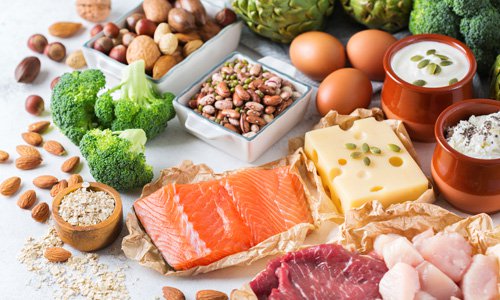Protein is an essential part of human nutrition. It helps to build, repair, and maintain the body’s structures. Foods derived from plants and animals can both provide quality protein, but there are some key differences.
Proteins are the building blocks of our bodies. They manufacture everything from muscles, organs to our bones, skin and hair. The body does not store protein like other macro-nutrients and so protein has to come from your diet.
Proteins are made up of amino acids. There are 21 amino acids, 12 non-essential and 9 essential, and the human body needs a balance of all 21 amino acids to function correctly. Non-essential amino acids can be made within our bodies whereas essential amino acids we need to attain from nutrition.
Animal sources of proteins are complete in form, such as:
- Fish
- Various types of eggs
- Dairy products such as cheese, milk and whey
- Red meat from cows and deer
- Poultry sources from chicken and turkey
Plant proteins are incomplete, which means they are missing at least one essential amino acid. Here are some examples of plant based foods rich in protein:
- Grains
- Lentils
- Nuts
- Beans
- Some fruits such as avocados
- Soy
- Hemp
- Rice
- Pea
Which protein source is best for health?
When choosing between animal and plant sources of protein, it is important to factor in other nutrient benefits that these foods provide. Foods rich in protein have widely ranging nutritional profiles.
- Animal proteins are generally richer in saturated fats, B Vitamins and iron.
- Plant protein sources contain phytonutrients, anti-oxidants and fibre.
There are many health benefits to each source of protein. In general, the best way to cover a person’s dietary needs is to eat a wide variety of foods.
Which protein source is best for building lean muscle?
Athletes and gym goers are always looking for the most effective protein sources to boost recovery and grow lean muscle. Protein is the key macro-nutrient to achieve that desired athletic look!
Many athletes choose to use whey protein, which is derived from dairy, to help them boost muscle growth. Whey protein, such as Scorpion 100% Whey Protein (https://scorpionsupplements.co.nz/products/scorpion-100-whey-protein/), is a clean & lean source of protein that has a full spectrum of desirable amino acids, that breaks down rapidly in our bodies to support recovery and it tastes delicious.
Some athletes choose to use plant protein powders, just like Active Naturals Pea Protein (https://scorpionsupplements.co.nz/products/active-naturals-100-natural-vege-protein/). The main benefit that plant protein has over whey protein concentrate is that it is lactose free, which can be easier on the digestive systems of individuals who have allergies to milk products. The main disadvantage of using a plant based protein is that it does not contain a complete spectrum of essential amino acids which is critical for building muscle and therefore these other essential amino acids need to be found in diet.
The other big benefit to using a plant protein is that it also contains fibre. Fibre comes exclusively from plants and is a complex carbohydrate. Unlike other carbohydrate sources, fibre does not convert into glucose but is used by the digestive system to slow down the rate of digestion (control blood sugar) and also helps to cleanse our intestines. Finally, plant based protein is also more friendly on the environment and is seen as a more sustainable nutrition source.
How much protein should you be ingesting per day?
The dietary reference intake (DRI) for the average sedentary individual is 0.8g per 1kg of mass per day. Therefore for a 70kg sedentary male, he will require 56g of protein per day to maintain his physique. Generally speaking, as you increase your amount of physical activity, you naturally increase your protein requirements. For the average strength training individual, it is recommended that you consume between 1.5-2g of protein per 1kg of body mass per day and the requirements increase further for extreme endurance athletes, who require the most amount of protein, with on average needing at least 2-2.5g of protein per 1kg of mass per day to maintain lean mass.
Conclusion
For most people, the choice between animal and plant protein involves a range of considerations. While some people focus on just a particular type of protein and choose a lifestyle based on this, conclusive evidence suggests that to optimise health as humans, we need to ingest a range of protein (food) sources and consume the right amount of protein per day that matches our lifestyle and goals.
Click here to find out more about our Active Naturals Pea Protein
https://scorpionsupplements.co.nz/products/active-naturals-100-natural-vege-protein/
Click here to find out more about our Scorpion 100% Whey Protein Concentrate
https://scorpionsupplements.co.nz/products/scorpion-100-whey-protein/


